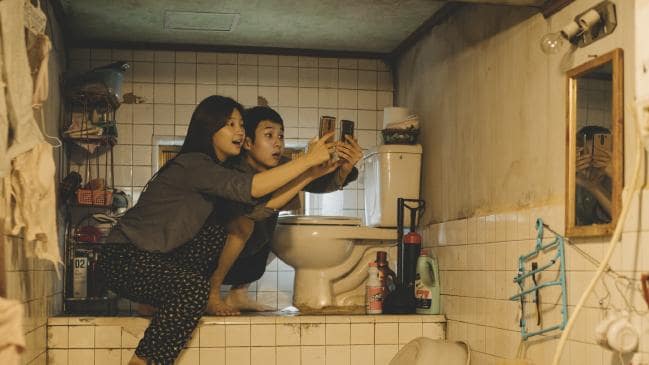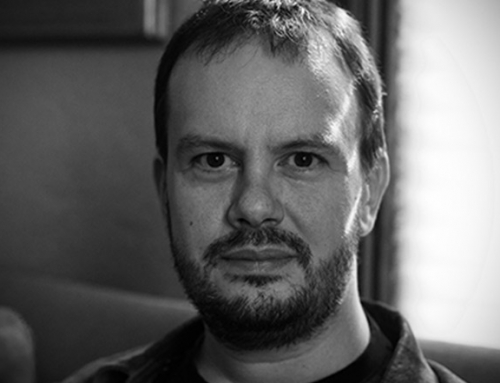Jason Lachlan Christopher is a manager at the Drexel Theatre. His fiction has appeared in Sanitarium Magazine and Horror, Sleaze, Trash. His film reviews can be found on his website A Yardstick For Lunatics.
From his blog:
“PARASITE” IS PURE PERFECTION
There used to be a commercial for Domino’s Pizza that always ruined my day. It starred an employee named Dale, who had owned 12 Domino’s franchises. He’d been with the company for 27 years. He was known as the fastest pizza box folder in the history of the company. The corporation made a commercial about Dale’s box-folding skills, portraying Dale as a man who loved, loved, loved his corporate overlords. He wasn’t quickly folding boxes because the store was busy and any late orders meant the men from up on high would come down to grind his ass into a fine powder. No, he was making these boxes because Domino’s was his life, an important facet of his personality.
It’s an absolutely miserable commercial, the kind of thing only a moron would think is funny, endearing, or cool. Dale appears to be emotionally dead. He stares into the boxes like a man who is mentally tripping to someplace less soul-deadening. Behind him are hundreds of pizza boxes, all stacked like a cardboard tidal wave about to crush poor Dale.
Folding pizza boxes is the gig Kim Ki-taek (Kang-ho Song) and his family are relying on at the beginning of Bong Joon-Ho’s masterpiece, Parasite. Cramped in a semi-basement apartment that affords them the view of drunks pissing on the sidewalk, the family struggles to find a new WiFi signal after the upstairs neighbor puts a password on hers. His son, Ki-woo (Woo-sik Choi), and daughter, Ki-jung (So-dam Park), manage to tap into the signal coming from a new cafe. They have to climb onto the toilet and hold their phones to the ceiling.
Too poor to throw anything away, Ki-taek and the family have crammed their apartment with stuff. This what poor people do. I know, because I grew up poor. I’m still fairly poor. When you don’t have much money to replace items, you cling to everything you own for dear life. You might never use some of the items, but it’s better have it and not need it than to need it and not have it. Welcome to poverty.
Stinkbugs have infested the house. When a fumigator comes down their street, the family leaves their windows open in the hope that it will kill off the insects. They cough and gag, but continue folding their pizza boxes. Their skills are called into question when a pizza shop employee points out all the ways they’ve screwed up the boxes. Mother Chung-sook glowers at the the pizza woman. Ki-woo, the eternal mediator, works out a deal to get paid for the boxes and replace a delinquent employee at the restaurant.
A friend named Min takes Ki-woo out for some drinks. Min is in college, tells Ki-woo about the immensely wealthy Park family he’s working for as a tutor. He’s about to leave to study abroad and wants Ki-woo to take over his gig tutoring the daughter, Da-hye (Ji-so Jung). Min is hoping to date Da-hye when she enters college in few years, and he considers Ki-woo to be the nonthreatening guardian he needs to make sure Da-hye isn’t preyed upon by another college boy.
Da-hye’s father, Dong-ik (Sun-kyun Lee), is one of those “innovators” magazines like Forbes always cover. They have more money than they’ll ever need, they lead technological behemoths (in Parasite’s case, Dong’ik’s company is called Another Brick), and you’re never quite sure what exactly they do. In contrast to the Kims, the Park’s home is the creation of a fictional mid-century modern architect named Namgoong. It’s sparsely decorated, a large coffee table and couch situated in the open living room, giant windows giving the Parks a view of the quiet, green patch of yard they’ve nursed in the middle of the city. The lack of material goods is a signifier of a certain type of wealth. You grow so rich that money and the things money can by lose all meaning. A person who hits that financial bracket no longer has the same needs or wants the rest of us have. They exist in a clean, hermetic zone, only interacting with the people they wish to. You might find a decade old pair of shoes at the Kims. I doubt the Parks keep the same shoes for more than six months.
Ki-Woo convinces Dong-ik’s wife, Yeon-kyo (Yeo-jong Jo), that he is qualified to teach Da-hye. Upon observing the youngest son (Hyun-jun Jung) acting wild, Ki-woo suggests to Yeon-kyo that he hire an art therapist he knows to help the child. Ki-jung forges documents for herself, memorizes some art therapy lingo from Google, and improvises a whole spiel to feed Yeon-kyo. The two Kim children are bringing in dough. Soon, Ki-taek and Cung-sook replace the Park’s driver and housekeeper. The entire Kim family has invaded the house under false pretenses.
In a less human film, the Kims would be portrayed as holy fools, skid row saints who are merely giving the upper-crust the type of retribution they serve. Bong is part of the increasingly rare specimen of director who embraces the chaos and nuance of real life. Films like Memories of Murder and Mother showcased Bong’s willingness to rebel against pat types and banal moral arguments.
The Kims are desperate people. They are likable, charming, funny, gregarious. We spend the first hour of the movie relishing in their duplicitous behavior. It’s the classic “slobs vs. snobs” set-up from hundreds of other films. There is a thrill in watching the lower-class muss the day-today existence of the mega-rich. Where the Kims come across as the kind of family who will stick together no matter what, the Parks exude a chilliness that initially frames them as creepy, sociopathic, maybe even dangerous. Dong-ik describes the connection between him as his wife as some approximating love. What does that mean? We never seem him harm the woman, or subject her to any emotional manipulation. He isn’t talkative, but there are times when it’s just him and Yeon-kyo and we see genuine affection between them. Words aren’t necessary. Perhaps it doesn’t fulfill our idea of a loving, healthy relationship. That’s on us, just as it’s on the Kims, who mistakenly size up the rich family as out-of-touch suckers.
Parasite forces the audience to question their prejudices, their desire for revenge, their fantasies of economic revolution. Ki-taek and his family prove all too willing to step on other poor people in an effort to remain at the tit of affluence. Some might say the title is too on the nose, but it is valid to wonder just who the parasites are. Yeon-kyo, the fussbudget who Chang-sook belittles as being “simple,” is actually a sweet woman who has legitimate concerns over her children. Her supposed daffiness masks a loving parent and wife. She lives in a gilded world, but is that a crime in and of itself? Bong supplies Yeon-kyo a reason to be disturbed by destitute people with nothing much to lose, though she doesn’t fully know the details. The press and social media would like us to believe every impoverished person as a benevolent soul incapable of malice. Those of us who have spent chunks of our lives with broke people in broke neighborhoods know there are plenty of scumbags, scabs, creeps, screwheads, and degenerates who willfully embrace a dead-end lifestyle. These creeps think nothing of harming other poor people.
This isn’t to say Parasite is a pro-wealth movie. The film is alternately hilarious and tragic, damning both families to horrors they could have avoided by refusing to adhere to clean-cut social lines. When a thunderstorm rolls through the city, Da-song sets up a tipi in the yard. The rain falls on the brightly colored tent and soothingly green grass. In the Kims neighborhood, everything is flooding. The sewers have backed up. Ki-jung, Ki-taek, and Ki-woo grab what they can from their apartment, the water rising to their chin. They are covered in shit, piss, and who knows what else. Ki-jung takes a moment to climb to the toilet, light a cigarette, and tap into the wifi signal from the cafe.
Socially, the family has always been covered in shit. They have no standing, no true hopes. They make plans, but the plans always fall through. The water is always rising, so why not pause for a cigarette? You cannot be angry at the tranquility of the Parks. Da-song doesn’t know any better. Him and his sister were born into a world they didn’t create. The flooding doesn’t affect them because they aren’t in that part of the life, just as you reading this probably don’t spend much time thinking about the homeless in your city, or the nightmare occurring in Syria, or any number of other tragedies that happened every minute. The Park’s obliviousness is not born out of malice. It’s merely humans being. The Kims are unaware of the hardships the Park’s have experienced, presuming their lives to be free of all worries. They don’t know what happened to Da-song in the first grade. They don’t know if the original housekeeper, Moon-gwang (Jeong-eun Lee), is silently suffering, or if the driver Ki-taek replaced will face any hardships from being unemployed. Accidental selfishness, I guess you could call it.
The movie is one of the most gorgeous films of the year. The Park’s crisp, germ-free home is shot with plenty of open space around the characters, going against the stuffy, untidiness of the Kim’s tiny apartment. The clan is forced to step over each other, sit cramped around a small dining table. There is no privacy, no space to call one’s own. Ki-taek is introduced curled up asleep on the floor, no blankets or pillow. Chang-sook crochets nearby. When the movie transforms into a crime thriller in the second hour, Bong seems to be channeling David Fincher’s subterranean lighting and style. The narrow hallways and green-lit rooms of a building contain hidden dread and last-chance wishes. The walls barely give any room to move. Pictures, books, and tchotchkes are all displayed on wet pipes and pock-marked cement. A climactic party is bathed in golden sunshine while turning into a Grand Guignol scene.
There is a moment when Dong-ik is interviewing Ki-taek, having the man drive him around in order to test his competence behind the wheel. Dong-ik holds a full coffee mug. He keeps it still, arm out over the seat. When Ki-taek makes a turn, Dong-ik watches the coffee. He doesn’t want it to spill. Ki-taek keeps the vehicle steady, despite being a nervous mess inside. He’s an actor, giving the millionaire what he wants to see, never betraying his appearance as a compliant, grateful worker.
To divulge much more of the film would be to ruin it. This is one of those exceedingly rare times when I agree the movie shouldn’t be spoiled. But there is so much to talk about! So many beautiful shots! So many wonderful editing choices! So many brilliant performances! Parasite is a movie to treasure. Work like this is something of a miracle. There is never a false note or superfluous story beat. This is pure perfection.
It also has the best high kick to the chest I’ve seen in a movie all year.








